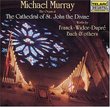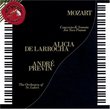| All Artists: Ludwig van Beethoven, Christoph von Dohnányi, Cleveland Orchestra Title: Beethoven: Symphonies No. 5 & No. 7 Members Wishing: 0 Total Copies: 0 Label: Telarc Release Date: 10/28/2003 Genre: Classical Styles: Historical Periods, Classical (c.1770-1830), Symphonies Number of Discs: 1 SwapaCD Credits: 1 UPC: 089408016325 |
Search - Ludwig van Beethoven, Christoph von Dohnányi, Cleveland Orchestra :: Beethoven: Symphonies No. 5 & No. 7
 | Ludwig van Beethoven, Christoph von Dohnányi, Cleveland Orchestra Beethoven: Symphonies No. 5 & No. 7 Genre: Classical
|
Larger Image |
CD DetailsSimilar CDs
Similarly Requested CDs |
CD ReviewsTime for some sacrilege... Ryan Richards | Midland, MI United States | 04/03/2000 (5 out of 5 stars) "...and here it is: I like Dohnanyi's interpretations of these two symphonies *even better than Kleiber's.* Gasp! Yes! Granted, it's true that Dohnanyi doesn't "punch" the brass or timpani in either of these symphonies the way Kleiber does, meaning the sound doesn't leap out at you with the terrifying growl of Kleiber's rendition. But "punch" doesn't equal "vision," and that's where Dohnanyi scores a million points with me. No matter how many times I listen to Kleiber's recordings of these symphonies, I can't shake the feeling that the orchestra's just going through the motions, playing what's on the page without thinking about how it sounds or what it means. Kleiber's Beethoven blasts out of the speakers, yes, but aside from his incredible first movement of the Fifth, it sounds empty; it's not trying to communicate anything. Some moments even sound anemic, and when did anyone ever associate anemia with Beethoven? In contrast, from the very first moment of the Fifth under Dohnanyi's baton, you know you're on a musical ride that's *going* somewhere--Dohnanyi can hear the message the music is trying to speak, and uses the notes as a vehicle to let that message shine through. Other reviewers have blasted this CD for its fast tempi. Historically, Dohnanyi's penchant for speed has sometimes worked against him; however, these two symphonies provide the perfect vehicle for his preferred conducting style. The Cleveland Orchestra just never lets up, and while initially these symphonies may sound rushed to those used to more ponderous interpretations, their constant forward momentum gives them a manic intensity I haven't found anywhere else. Both these symphonies shine with life and vigor and tightly controlled power, but it's energy matched with skill: even on the fastest passages, every note comes off with near-perfect precision. In every other recording I've heard of these two symphonies, there are points where each section of the orchestra is slightly off-kilter; here, each section blends together seamlessly into what sounds like one big symphony machine--meaning there's little to no human imperfection standing between listeners and the power of Beethoven's musical visions. In addition, Dohnanyi takes time to observe fine points that get edged out of most other recordings. Listen to the whipcrack of the last note of the Fifth's first movement. Whap! You KNOW that movement's over. Listen to the wistful, simple tenderness of the second movement's theme, or the majestic, brilliantly full sound of the finale, which never gets bland even on the string arpeggios near the beginning. How about the bold brilliance of the first movement of the Seventh, or the way the normally listless second movement of that symphony is turned, under Dohnanyi's direction, into an inexorable funeral march toward fate a la the Eroica's slow movement, juxtaposed against a wistful reminiscence of better things past. Listen to the orchestra let out all the stops on the Seventh's last movement, sharply punctuated by dead-on brass work I daresay even Kleiber doesn't match. After all this rambling, here's the bottom line: I've found other interpretations of these symphonies more immediately powerful, or frightening, or intense, but THESE two have been the only ones with the vision Beethoven's music desperately demands, and that vision has been what's kept them sounding fresh, engaging and enjoyable long after all those other interpretations have been consigned to the shelf to collect dust." A STUNNING, PRECISE PERFORMANCE N. Keeley | 12/20/1999 (5 out of 5 stars) "In this recording, Dohnanyi and the Clevelanders go for clarity, insight and energy ... and they achieve them wonderfully. Maybe the other reviewer from Wichita was seeking something more hystrionic (like, say, Bernstein), whereas this CD is for Beethoven lovers (and newcomers) who are more interested in musical insight (Dohnanyi's trademark) and technical precision (Cleveland's trademark). Don't miss these performances, captured in Telarc's glorious, expansive sound." Very good 7th, not so good 5th N. Keeley | Salt Lake City | 12/09/2007 (3 out of 5 stars) "Many people will compare this recording with Kleibers classic recording of the 5th. Well there is no comparison. Kleibers recording has proved the test of time and will live on as the all time greatest 5th. Dohnanyi's 5th lacks passion and intensity. Insightful? Not in my opinion. Although the sound is crystal clear and the Cleveland orchestra plays beautifully the tempo's feel too rushed and sound too shallow for the 5th. Where is the drama? The last movement with its triumphant motive looses tremendously with the fast tempo. Stick with the classics for this one, ultimately you'll be more fullfilled. Now the 7th.... Beethoven regarded the 7th symphony as one of his greatest musical achievements, and indeed it is. Written in 1812 it was first played for wounded soldiers. Uplifting, high spirted music in an otherwise war torn Europe. This is a fine recording of this great symphony. Dohnanyi's interpretation is very good, very crisp and energetic, up tempo with lyrical phases and perfect, precise rhythms. His style works quite well here. The Cleveland Orchestra plays with absolute perfection. From the opening Adagio Molto-Allegro Con Brio to the complex rhythms and tension in the final, the music flows with an energy and vision deserving of Beethoven's masterpiece. A worthy accomplishment, that I would place in the top three 7th's on recording. Unfortunately, this recording only deserves 3 stars because of the sub par 5th."
|

 Track Listings (8) - Disc #1
Track Listings (8) - Disc #1













